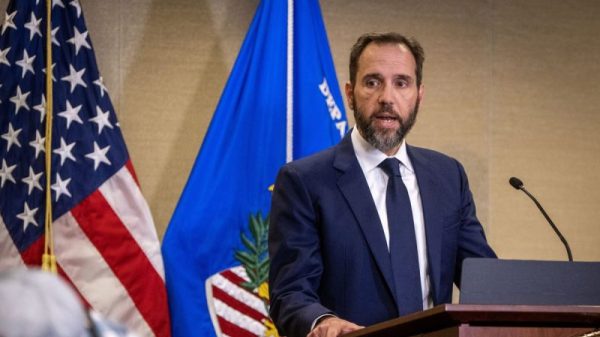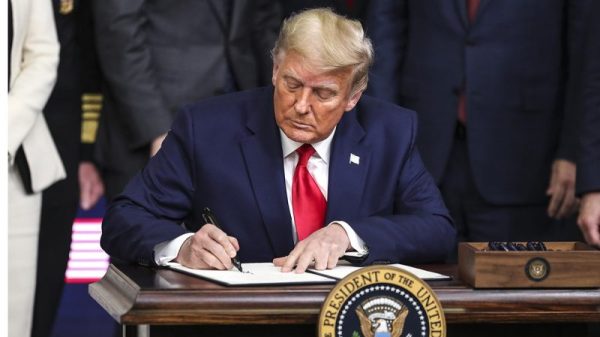RAMSTEIN AIR BASE, Germany — Pentagon leaders vowed Tuesday to stand by Ukraine in its war to repel Russian forces despite deepening questions about whether the Biden administration can overcome Washington’s political gridlock to free billions of dollars in additional U.S. military aid.
Defense Secretary Lloyd Austin, following talks here with senior officials from more than 40 partner nations, described the conflict’s dramatic global stakes as Russian President Vladimir Putin’s two-year-old invasion remains mired in a costly stalemate.
“Today, Ukraine’s survival is in danger, and America’s security is at risk,” Austin told reporters. “They don’t have a day to waste, and we don’t have a day to spare either. So I leave here today fully determined to keep U.S. security assistance and ammunition flowing.”
Austin cited a grim array of costs to Moscow from its campaign to subjugate Ukraine: 315,000 Russian troops killed or wounded; 20 of its medium- and large-sized naval vessels damaged or destroyed; more than $1 trillion in unrealized economic growth. He also spotlighted ongoing arms donations for Ukraine from European allies, including a new Czech-led initiative to procure 800,000 artillery shells.
Tuesday’s meeting, the 20th gathering of the U.S.-led Ukraine Defense Contact Group, came as Ukrainian leaders make urgent appeals for additional military supplies, particularly artillery shells and air defense interceptors, that they say are necessary to protect civilians and prevent Russia from making additional advances.
Austin and Air Force Gen. Charles Q. Brown Jr., chairman of the Joint Chiefs of Staff, held talks beforehand with Ukrainian Defense Minister Rustem Umerov and Gen. Oleksandr Syrsky, who became the country’s top commander in a military shake-up last month.
Yet the meeting also underscored the uncomfortable dynamic the Biden administration must navigate as it attempts to lead the international effort to sustain Ukraine’s fight without being able to provide concrete assurances about its own future support.
Since Putin’s invasion, the United States has ranked as Ukraine’s biggest military supporter by far. But despite months of White House entreaties, Congress has yet to pass President Biden’s request for $60 billion in additional security aid, part of a larger package that would also include assistance to Israel for its war in the Gaza Strip.
While some lawmakers are now attempting to get around the refusal by House Speaker Mike Johnson (R-La.) to hold a vote on the bill, it remains far from clear whether Biden’s proposal can overcome skepticism among certain Republicans.
After months without new U.S. donations, officials last week announced that the Pentagon will provide Ukraine a new arms shipment worth $300 million made possible by unforeseen contract savings. But military leaders have warned that further dipping into U.S. arsenals without new funding to restore donated arms would endanger American security.
Ukrainian forces meanwhile are rationing artillery at the front and scaling back attempts to shoot down air attacks directed at Ukrainian cities. Against that gloomy backdrop, U.S. officials foresee a range of bleak scenarios if the administration’s supplemental bill remains blocked, including a potential collapse of Ukrainian lines.
The uncertainty is stoked further as Biden’s race to secure a second term heats up ahead of November’s presidential elections. Former president Donald Trump, his likely Republican opponent, has declined to commit to assisting Ukraine in the future and has said that any continued support should come in the form of loans rather than donations.
Austin cited broad support in both parties for continuing aid to Ukraine despite the holdup in Congress.
“I’m optimistic that we will see some action moving forward,” he said. “But again, this is a thing that you can’t absolutely predict. We’ll continue to work closely with Congress and our international partners to ensure that Ukraine receives the support it needs.”
In Europe, U.S. allies are racing to revitalize their own defense industries and reconsidering their own risk tolerance as they mull additional donations to Ukraine. Some of those allies are likewise attempting to downplay the impact of uncertainty surrounding U.S. assistance, chalking the situation up to politics.
Asked about the U.S. impasse over Ukraine, German Defense Minister Boris Pistorius, whose coalition government has faced its own internal challenges, referenced the “special aspect” of America’s political system.
“So we have to deal with it and we will deal with it,” he told reporters on the margins of the Ramstein meeting, saying that European countries had taken steps of their own to bolster their security and military strength. “So we are doing our homework, and I am sure and I’m convinced the United States will [do] like it used to do before too.”
Austin and Brown also addressed the Biden administration’s increasingly deep rift with the government of Israeli Prime Minister Benjamin Netanyahu over that country’s handling of its war against Hamas militants in Gaza.
National security adviser Jake Sullivan on Monday said that Netanyahu’s government had agreed to send a team of military, intelligence and humanitarian officials to Washington to discuss U.S. concerns about Israel’s plan to launch a major offensive in the southern city of Rafah, where more than 1 million people have taken shelter, and examine possible alternatives.
Brown said he has not seen Israel’s blueprint for its planned Rafah offensive. He pointed to the U.S. military’s own history operating in urban environments in the Middle East and said American officials were attempting to share lessons learned from those experiences, including steps to protect civilians.
The Biden administration has likewise blamed Israel’s government for holding up the delivery of aid in Gaza — where the United Nations says famine conditions are imminent — even as it tasks the U.S. military with dropping food aid from cargo planes and building a floating pier to enable deliveries by sea.
Austin has warned that Israel could end up facing “strategic defeat” if it fails to adequately protect civilians. According to Palestinian authorities, more than 30,000 people have been killed in Gaza since Israel launched its response to Hamas’s Oct. 7 attacks, which killed some 1,200.
“Israel has a right to defend itself. But there’s also a need to protect the civilians in the battlespace,” he said. “And again, the two things aren’t mutually exclusive.”






































